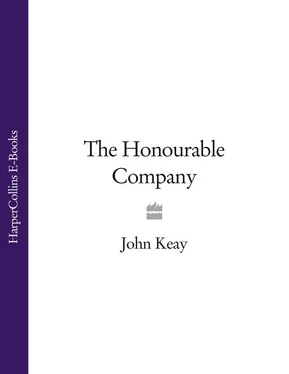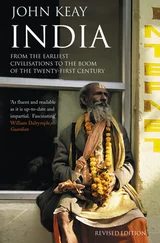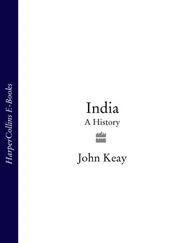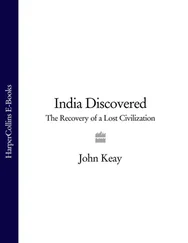Here was an object lesson in what could be achieved by concerted endeavour and it was not lost on London’s merchants. In particular the members of the Muscovy and Levant Companies, men already accustomed to take a world view of trade, organized into powerful and exclusive syndicates with access to capital and influence, yet independent of both court and government, rose to the challenge. The Levant Company’s hopes of tapping into the overland trade in spices and other eastern commodities through agencies in Persian and Turkish territory were clearly doomed now that the Dutch had shown that they could drive a highly profitable trade direct with the Spice Islands. Imitation remained the only sincere form of competition and it is a measure of the English success that within a decade the Levant Company, instead of importing spices from the Middle East, would be exporting them from London to the Middle East.
The final straw came with the news that the Dutch were now seeking to augment their eastern fleets by purchasing English shipping. Arguing that the national interest was at stake, in July 1599 – just two months after ships of the second Dutch fleet began returning with packed holds – a petition was ready for Queen Elizabeth’s perusal.
For a critical year Her Majesty stalled. Peace negotiations with Spain were at a sensitive stage and it was rightly thought that they would be prejudiced by any English commitment to contest the spice trade. The petitioners responded by producing a list of all the ‘islands, cities, townes, places, castels and fortresses’ occupied by the Portuguese plus another list, even longer, of all those they did not occupy. Their argument, which would later become all too familiar as the interloper’s apologia, was simply that if the Portuguese had no interest in these other ‘places’ – which included such significant markets as Siam, Bengal, Japan, Cambodia and ‘the most mighty and wealthy empire of China’ – then there could be no harm in ‘other princes or people of the world repairing unto them’. There was no need for a direct confrontation with the Portuguese and, as will be seen, the English would go out of their way to develop and explore all of them. On the other hand Her Majesty knew her swashbuckling subjects well enough not to suppose that they would ever willingly forgo a laden carrack. It was not therefore until negotiations with Spain faltered that a new petition was invited and the Royal Charter at last granted.
Amongst the names of the 218 petitioners who celebrated New Year’s Eve 1600 as ‘The Company of Merchants of London trading into the East Indies’ was that of James Lancaster. He probably helped to draft the original petition and he was certainly one of the Company’s first ‘committees’ (directors). He also had a hand in drafting that standard royal letter, a copy of which he would present at Aceh. But already there were those at Court, like the Lord Treasurer and the Earl of Essex, who saw the new company as a rich mine of patronage and who were all for working it, notably by leaning on the directors to appoint Sir Edward Michelborne as commander of the first fleet. The directors stood firm; their choice was Master James Lancaster and by way of explanation they insisted on being allowed ‘to sort out theire business with men of their own qualitye’. Indeed, lest suspicions of jobbery scare off any of their investors, they resolved ‘not to employ any gentleman in any place of charge’. They approved of Lancaster’s democratic style of leadership and, more to the point, they vigorously resented any Court interference. But as the Company’s annalist would gloomily note, here was evidence that even before the Company had been fully constituted ‘that influence which in the sequel will be found to be equally adverse to the prosperity of their trade and the probity of their directors had its commencement’. Michelborne, incidentally, instead of being the Company’s first commander, would become its rival as the first interloper.
After frantic preparations Lancaster sailed from Woolwich with four ships in February 1601. The Red Dragon, his flagship, had been bought from the Earl of Cumberland who was at this time the only titled member of the Company. The vessel partook of his Lordship’s ‘quality’. She was of 600 tons, had been built for privateering in the West Indies, and like most subsequent ‘East Indiamen’ was as much warship as cargo carrier with thirty-eight guns plus space, if not accommodation, for 200 men. To maintain her complement at 200 Lancaster, mindful of past disasters, prescribed lemon juice for all ranks. Three spoonfuls per man were administered every morning as they sailed into the scurvy latitudes of the south Atlantic. The dosage seemed to work. During the six months that it took to reach the Cape the men of the Red Dragon remained in rude health.
It was not so in the rest of the fleet. The Hector, the Susan and the Ascension were somewhat smaller ships and had all been active in the Levant trade. Each carried about 100 men, the total for the whole fleet being 480. Of these, 105 were dead by the time they reached the Cape. So weak were those that remained that men from the Red Dragon had to be sent to assist in bringing the other ships into Table Bay.
Then known as Saldania, Table Bay proved a good spot to recuperate. Sails were taken ashore and a tented rest camp prepared. Good water, fresh fruit and the mellow winter climate saw the sickly men quickly recover and provided ‘a royal refreshing’ for all. Meanwhile Lancaster renewed his acquaintance – he had stopped here in 1591 – with the ‘Saldanians’. ‘Of a tawny colour, of reasonable stature, swift of foot, and much given to pick and steal’, the Africans were as yet shy of European visitors and were easily kept at a distance. Additionally there was a problem of communication. The natives ‘spoke through the throat’ and ‘clocked with their tongues in such sort that in…seven weeks…the sharpest wit amongst us could not learn one word of their language’. Lancaster, rising to the occasion in a way that no gentleman would have contemplated, spoke to them ‘in cattel’s language’. Thus, wishing to buy sheep, he said ‘baah’ and ‘for oxen and kine “moath”, which language the people understood very well without any interpreter’. Soon droves of livestock were converging on the camp and changing hands at rates which the English found frankly laughable. A piece of old iron, rowlock-size, bought a sheep, and two pieces bought an ox ‘full as bigge as ours and very fat’. With 1000 sheep and 42 oxen – plus wine, olive oil and meal removed from a small Portuguese supply ship which had fallen into English hands – the fleet left Table Bay as well provisioned as it had Woolwich.
As an alternative to Saldania future voyages would often make for one of Madagascar’s sheltered bays. Lancaster’s fleet passed along the east coast of the island and on Christmas Day 1601 put into the bay of Antongil to load water, rice and fruit and to replenish stocks of lemon juice. Here they also assembled a small pinnace of about eighteen tons which they had brought from London in kit form. Of lesser draught, it would be used for sounding in coastal waters and as a tender for bringing cargoes out to the main fleet.
While the ‘pinis’ was being ‘sheathed’, as the anonymous chronicler charmingly puts it – he means the pinnace was being clad with an outer shell of local timber – men again began dying. From the Red Dragon were lost the master’s mate, the preacher, the surgeon and ‘tenne other common men’. Similar losses were reported from the rest of the fleet. ‘Those that died here died most of the flux [dysentery] which, in our opinion, came with the waters which we drancke.’ This was not, however, the case with Captain Brand of the Ascension, who had the unusual misfortune of being shot by the guns of his own ship. In sombre mood he was being rowed ashore to attend the funeral of the Red Dragon’s mate when the Ascension’s gunner let fly with the usual three-gun salute for a deceased officer. Unfortunately the gunner, ‘being not so careful as he should have beene’, had forgotten that his guns were loaded and that the Captain was within range. One ball scored a direct hit and ‘slew the Captain and the boatswain’s mate starke dead; so that they that went to see the funeral of another were both buried themselves’.
Читать дальше












